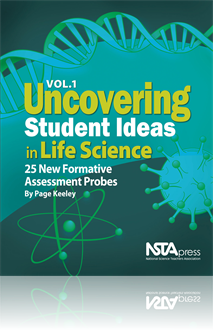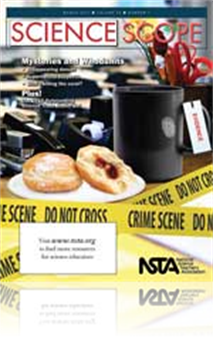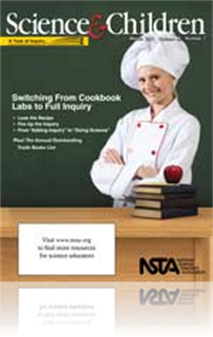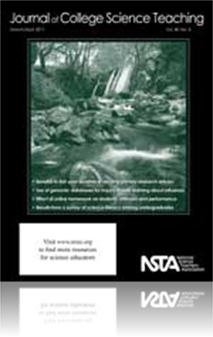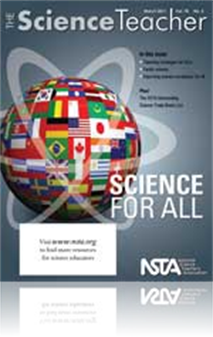All Resources
Book Chapter
The purpose of this assessment probe is to elicit students’ ideas about living things. The probe is designed to determine whether students recognize that seeds are living when they are in a dormant state. ...
Book Chapter
The purpose of this assessment probe is to elicit students’ ideas about “plant food.” The probe is designed to reveal whether students recognize that plants use the sugars they make as their food. ...
Book Chapter
The purpose of this assessment probe is to elicit students’ ideas about the flow of energy in a trophic relationship that children are most familiar with—food chains. The probe is designed to find out if students recognize that most of the energ...
Book Chapter
The purpose of this assessment probe is to elicit students’ ideas about the transfer of matter and energy in ecosystems. The probe is designed to reveal whether students recognize that only matter is cycled through an ecosystem. ...
Book Chapter
The purpose of this assessment probe is to elicit students’ ideas about adaptation. The probe is designed to reveal whether students hold Lamarckian ideas about individual organisms adapting to changes in the environment. ...
Book Chapter
The purpose of this assessment probe is to elicit students’ ideas about sexual reproduction. The probe is designed to reveal whether students recognize that multicellular organisms develop from a fertilized egg. ...
Book Chapter
The purpose of this assessment probe is to elicit students’ ideas about life cycles. The probe is designed to see if students recognize that the pupal stage of a life cycle is a living organism. ...
Book Chapter
The purpose of this assessment probe is to elicit students’ ideas about structures they encounter when they learn about heredity. The probe is designed to reveal students’ ideas about the “parts and wholes” relationship between DNA, genes, an...
Book Chapter
The purpose of this assessment probe is to elicit ideas about genetic traits. The probe is designed to see if students recognize that some traits, such as eye color, are complex and cannot be predicted solely by the result of one gene. ...
Book Chapter
The purpose of this assessment probe is to elicit students’ ideas about the cellular makeup of the human body. The probe is designed to see if students recognize that the body is an organized collection of cells and not a structure or “outline...
Book Chapter
The purpose of this assessment probe is to elicit students’ ideas about a scientific word they frequently encounter in middle and high school science, chlorophyll. The probe is designed to reveal whether students know that chlorophyll is more th...
Journal Article
A Watery Whodunit: The Case of the Missing Zooxanthellae
Understanding coral reefs and the threats they face is an essential precondition in preserving them. This activity helps to educate middle school students about coral biology and the problem of coral bleaching. It will inspire students to participat...
Journal Article
Science 101: What causes surface tension?
This column focuses on background science information for elementary teachers. In this month’s column, learn about surface tension....
Journal Article
Flooded! An Investigation of Sea-Level Rise in a Changing Climate
Explore how melting ice sheets affect global sea levels. Sea-level rise (SLR) is a rise in the water level of the Earth's oceans. There are two major kinds of ice in the polar regions: sea ice and land ice. Land ice contributes to SLR and sea ice doe...
Journal Article
Use of Genomic Databases for Inquiry-Based Learning About Influenza
The genome projects of the past decades have created extensive databases of biological information with applications in both research and education. We describe an inquiry-based exercise that uses one such database, the National Center for Biotechno...
Journal Article
An obvious lesson means far-from-enthusiastic students. By adding a second variable, this water pressure and depth investigation provides students with a problem to solve and identify. With two variables, students had to use inquiry to determine whic...
Journal Article
Teaching Through Trade Books: Let's Try It Out in the Air
This column includes activities inspired by children’s literature. In this month’s issue, the lessons challenge students' common misconception that air is "nothing." Students participate in activities, collect evidence, and develop explanations t...
Journal Article
Tech Trek: The move to movies: Instruction that engages
Take a look at the latest classroom technology. Learn about the latest movie software for your computer that allows you to create your own instructional materials and students to present their own multimedia projects....
Journal Article
Editorial: Stuck in the Certainty Gradient
We are increasingly seeing incoming college students who haven’t experienced (or perhaps haven’t responded to) this gradual presentation of increasing uncertainty. And the author believes this is one of the profound and unrecognized disconnects i...
Journal Article
Editor's Roundtable: Sleuthing with science
Science Scope’s editor shares thoughts regarding the current issue....
Journal Article
Favorite Demonstration: The Cell Organelle Pageant
The Cell Organelle Pageant is an activity to reinforce student’s understanding of the structure and function of eukaryotic cell organelles. This activity should follow readings and a lecture presentation on cell types and structures. Students often...
Journal Article
Everyday Engineering: Windmills are going around again
Learn how to create a pinwheel to explore wind power. In this lesson, students will construct a simple pinwheel-type windmill to test the power generated by different designs. ...
Journal Article
Your Syllabus Should Set the Stage for Assessment for Learning
In this article, the authors describe how a syllabus can be used to set the stage for effective use of assessment-for-learning principles. Nearly all college instructors use a syllabus, but this document typically dwells on logistics and evaluation. ...
Journal Article
Career of the Month: An Interview With Horticulturist John Stier
Horticulture—the science and art of cultivating plants—is host to a dynamic array of careers. Horticulturist John Stier researches turfgrass to develop high-quality sports fields. At the 1994 World Cup, he watched the U.S. men's team play on the ...
Journal Article
Mythbusters, Musicians, and MP3 Players: A Middle School Sound Study
Create your own speakers for an MP3 player while exploring the science of sound. Review of science notebooks, students' intriguing cabinet designs, and listening to students talk with a musician about the physics of an instrument show that complex co...
Journal Article
Scope on Safety: Safety in the field
This column shares safety information for your classroom. In this month’s issue the author discusses how to navigate field trips safely through careful preparation and planning. The field trip is priceless and helps make science come alive for stu...
Journal Article
Milk Fireworks, Cat's Meow, Breaking the Tension--whatever you call it, this lesson will provide strategies for taking a simple, hands-on activity and transforming it into inquiry. The lesson is ideally suited for teaching important concepts in exper...
Journal Article
Who Stole the Doughnuts? An Interdisciplinary Forensics Unit
There was a doughnut thief loose and the students were determined to put their science skills to use to track down the culprit. They would use forensic science to eliminate suspects and identify the thief who stole the doughnuts. School staff take on...
Journal Article
Science 2.0: Personalizing the PC for Accessibility
Personalizing the PC for Accessibility. Students with disabilities need access to computers in the classroom—but this goes beyond the mere availability of a machine. This month's column describes some of the Apple and Microsoft computer features th...
Journal Article
Editor's Note: Moving Toward Inquiry
Science and Children’s editor shares thoughts regarding the current issue....
Journal Article
Formative Assessment Probes: The Mitten Problem
This column focuses on promoting learning through assessment. In this month’s issue, the theory of "immaculate insulation" is prevalent among students. This formative assessment probe will help students overcome this misunderstanding by allowing th...
Journal Article
Scope on the Skies: Changing of the seasons
This column focuses on astronomy throughout the year. In this month’s issue learn the astronomy behind the changing of the seaons. Students know that we mark the change of seasons with the position of the Sun over certain parts of the Earth. The sp...



